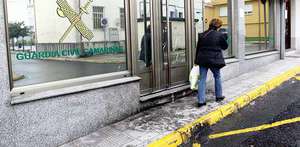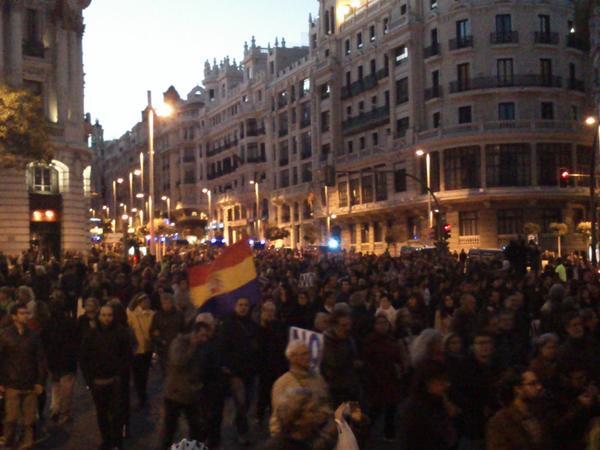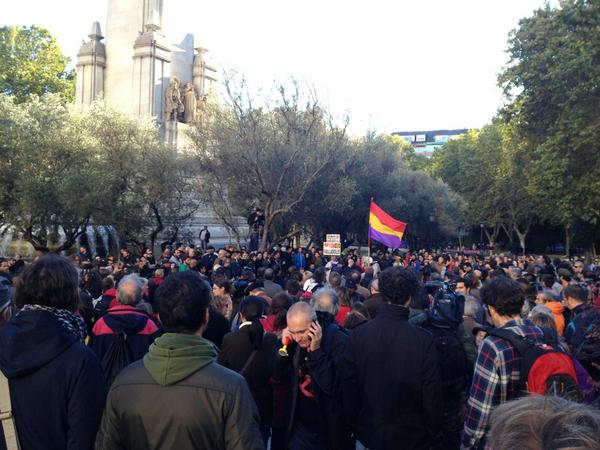In 2009 the Spanish Unionist parties executed a legal coup in the Western Basque Country, with the help of their imposed Law of Political Parties, which was designed to ban a major Basque force only because they did not bow to the impositions of the neofascist regime in Spain, promoted by dictator Franco and his political successors (the Double Bourbon monarch, Suárez, Fraga, González, etc.)
Because of that we have suffered for these years a most oppressive situation in which the social-democrats (PSE-PSOE) revealed themselves as the fascists they actually are, wasting money in hyper-expensive Spanish flags, using police to repress the citizenry with even more brutality than before (with one person killed this Spring), destroying the Basque welfare system, Basque radio-TV so extremely biased, even in a sexist sense (promoting female anchors with stiletto high heels and very long hair, as if this would be some sort of Western version of Talibanistan) that audience simply collapsed to half the traditional levels and in general acting as a the fascist appointed puppet government they are.
This nightmarish situation is finally coming to an end and we go back to the political normality that, with minor changes, existed in the Western Basque Country for decades: the Basque Nationalist Party rules one way or another, always in minority, always needed of supports, always lacking a credible alternative.
The Western Basque elections have again produced a very divided parliament, albeit a normal and democratic one for a change:
It is interesting anyhow not just looking to the seats attained but very specially to the votes gained and lost, and not in percentage but in raw numbers:
 |
| Western Basque (E.A.E.) elections October-21st-2012 |
Compared results but party (using both 2009 farce vote and
the 2005 more real elections):
- EAJ-PNV: the "winner" lost 16,000 votes re. 2009 and 84,000 votes re. 2005 (when it run together with Basque Solidarity, EA, now in EH Bildu)
- EH Bildu: impossible to compare with 2009 (legal ban of its backbone) but its more distinctive approximate components (Basque Nationalist Left, then running in two different parties) gathered 179,000 votes in 2005, what means an estimate gain (very much arguable, I know) of some 98,000 votes, being the only major list to improve results.
- PSE-PSOE: loses 106,000 relative to the 2009 farce and 75,000 relative to 2005. It is a major collapse (35% of 2009 voters have deserted them), paying dearly their disastrous fascistoid rule in Gasteiz as in Madrid.
- PP loses only 16,000 votes re. 2009 but 82,000 votes relative to 2005. They seem to resist but their long term photo is of clear decline.
- (dis-)United Left: the Spanish true left coalition recently faced disintegration in the Basque Country, with a major faction (Alternatiba) joining Bildu (then Amaiur, now EH Bildu), another major faction remaining loyal to the all-Spain project and yet another fraction, totally delegitimized by corruption scandals, retaining the legal name. The main surviving distinct fraction (EzkA-IU) lost some 6000 votes re. their 2009 results (the corrupt fraction EB got 17,000 votes so they actually gained 11,000 overall) and 35,000 the 2005 election. They lose all representation and may be a while before they recover it.
- UPyD: the former Basque Councilor Rosa Díez' maverick populist party with clear fascist tendencies, loses a few hundred votes, essentially repeating results. Unlike United Left, they managed to keep a seat even if they have less votes (but not in the key province of Araba, where each vote is worth four times as one in Biscay and twice one in Gipuzkoa).
Overall... well, Ken Brockman welcomes our new overlords from outer space, which are the same as always: Zionist International, NATO, EU, IMF, Goldman Sachs, the Bundesbank, BBVA, Iberdrola, Petronor, etc.
We should expect a PNV-PSOE pact... unless suddenly the ghost of
Sabin Arana awakens and shatters the Basque Nationalist Party into walking the path of independence, maybe by the hand of the Catalans...
But I'm dreaming awake I reckon.
Main source for the graphs:
Naiz Info.
Update (Oct 22): a bit of analysis:
Iñaki Iriondo has today
a somewhat interesting analysis[es] at Naiz Info. I'll reflect here some of his key observations:
- Compared with the all-Spain elections of Nov. 2011, the People's Party (PP, unionist right) lost 2/5 of supports: from 210,000 to 130,000 votes. In general their position keeps being eroded and they only represent 7.5% of the census, no matter what they say.
- EH Bildu grows in Araba and Biscay, where it is opposition, and declines somewhat in its stronghold of Gipuzkoa, where it is governing in minority (retaining however 88% of the 2011 voters for Amaiur - same forces, different name).
- Left and Right are technically tied in the new parliament effectively preventing any temptations for the PSOE to break ranks with the IMF directives and align with the sociological majority. This situation is caused by the political suicide of the PSOE (discussed above) and the factional disintegration of United Left, rather than any non-existent advance of the unapologetically bourgeois parties.
- Urkullu (PNV) can even choose to be elected Lehendakary by its own minority (in third vote, per the Western Basque electoral law) and then sort out the pacts for each law or budget (he most probably won't but the option is there, reinforcing his position).
- While the defeated Galician leader of the PSOE, Pachi Vázquez, has resigned overnight, his Basque homologue and namesake, Patxi López, has not even considered resignation but is even postulated by some of his Spanish comrades for top leadership positions in Spain. Iriondo does not say but this is obviously because he has served well our Spanish overlords in the rather uncomfortable position of fascist proconsul. It's also disturbing to watch the PSOE so completely lost in their neoliberal suicide by internal loss of all substance, so unable to imagine any alternative that they want to create a "leader" out of the grey nothingness that is Patxi López.
- UPyD is another failure, totally unable to collect dissident votes from the PP and PSOE, no matter if they try to capitalize the victims of ETA or the many abandoned by the demolition of welfare... nobody else puts their trust on them.
Update: voting in Bilbao
Bilboko Branka[eu] has a map showing leading party in each neighborhood and also results in bar graphs (click at "emaitzak grafikoetan" links for each district's gallery).
The map:
 |
| (click to expand) |
The dominance of the Christian-Dems is overwhelming, even in large neighborhoods that are clearly working class (Santutxu, Errekaldeberri, Uribarri, Basurtu, etc.) The PSOE's lead is restricted to the slums erected under Fascism to host the hordes of immigrants like Otxarkoaga, while the influence of EH Bildu is strongest instead in the Old Quarter, also very much working class, albeit of Basque identity mostly.
In general, if you look at the neighborhood bar graphs, we can see that the PSOE collapsed everywhere, while EH Bildu is not strong enough in this city to take their role, resulting in a PNV victory by default.
Update: results town by town and evolution of the Left-Nationalist vote in the last elections:
Naiz Info offers the
detailed results town by town in PDF format.
It also provides this graph (
PDF) of the evolution of the Left-Nationalist vote in the last elections (2011-12). Notice that Aralar run separately in the provincial elections ("forales 2011"):
We can see that it is essentially the same with only minor fluctuations and, if anything, slight loses, even if it has gathered more people (Aralar) under the same banner.
This may be a clear example of how integrating social-democrats and evolving towards an obsolete integrated social-democratic discourse is actually harmful in these times of deep violent crisis. But, of course, the matter is subject to interpretation.
Update: Electoral history of the Western Basque Country (autonomous Parliament):
Another version of the same data graph, maybe easier to read:

































